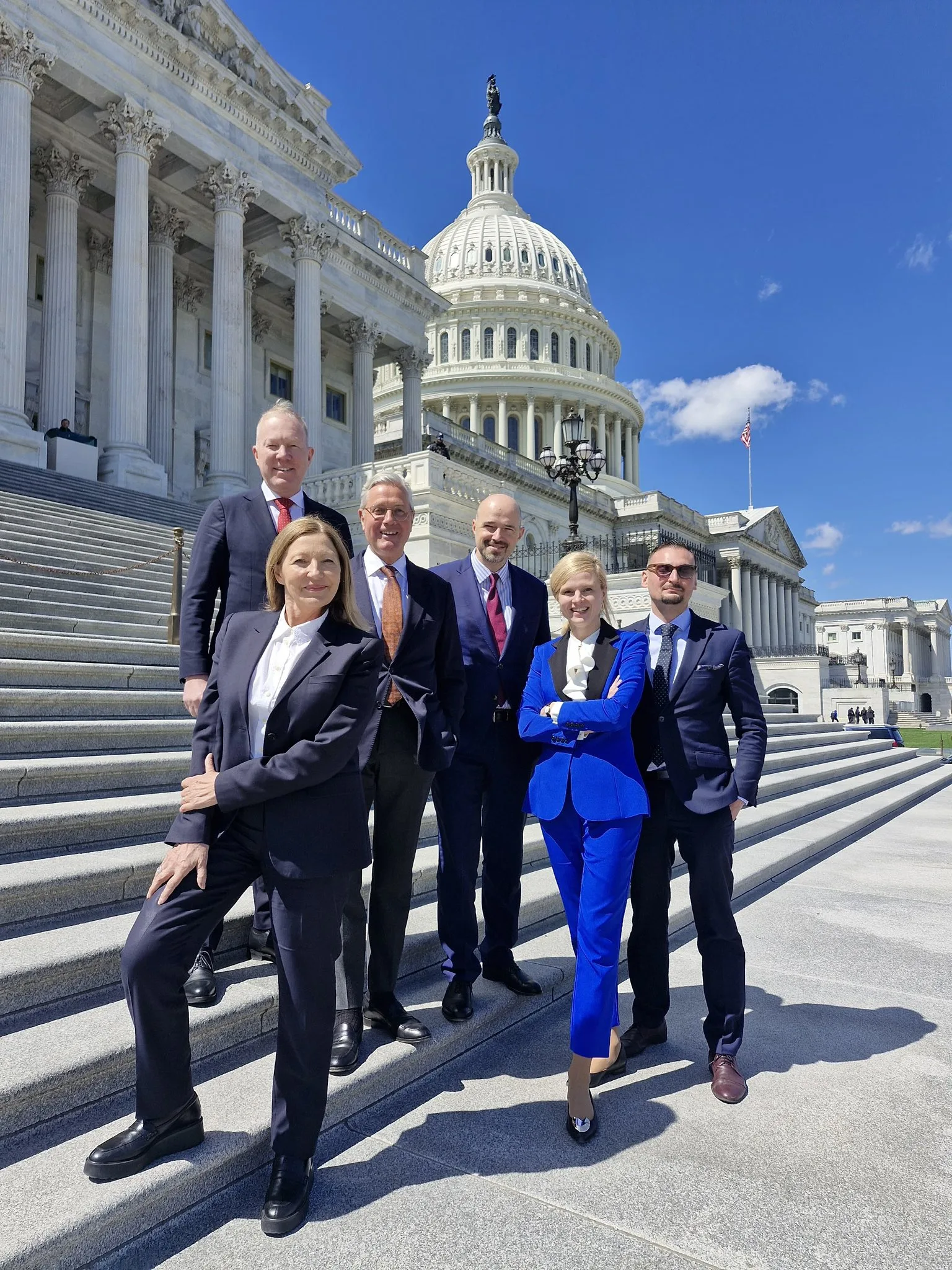
14-04-2025
Warsaw Security Forum Leads the Second Weimar Triangle Plus Delegation to Washington, D.C.

14-04-2025
Warsaw Security Forum Leads the Second Weimar Triangle Plus Delegation to Washington, D.C.
The Warsaw Security Forum led the second edition of the Weimar Triangle Plus Parliamentary Delegation to Washington, D.C. on April 7-9, reaffirming our shared commitment to transatlantic cooperation and Europe’s responsibility in global security.
This high-level advocacy visit brought together prominent members of foreign affairs and defense committees from across Europe:
- Paweł Kowal – Chair, Foreign Affairs Committee, Sejm of Poland
- Marko Mihkelson – Chair, Foreign Affairs Committee, Parliament of Estonia
- Natalia Pouzyreff – Member, National Assembly; Committee on Defense & Armed Forces, France
- Norbert Röttgen – Member of the Bundestag, former Chair of the Foreign Affairs Committee (2014–2019)
The Delegation was headed by Prof. Katarzyna Pisarska, Chair of the Warsaw Security Forum, accompanied by Zbigniew Pisarski, President of the Board of the Casimir Pulaski Foundation, Tomasz Smura, Member of the Board, and Tomasz Obremski, Program Coordinator.
Throughout the visit, delegation members held impactful conversations with the U.S. State Department’s Bureau of European and Eurasian Affairs and U.S. legislators, including :
- Rep. Brian Mast – Chair of the House Foreign Affairs Committee;
- Rep. Keith Self – Chairman of the House Subcommittee on Europe;
- Sen. Mitch McConnell – Chair of the Senate Rules Committee;
- Rep. John Wilson – Founder and Co-Chair of the European Union Caucus;
- Rep. Jason Crow – Member of the House Committee on Foreign Affairs;
- Rep. Derrick Van Orden – Chairman of the Economic Opportunity Subcommittee.
The Delegation also held a briefing for Congressional Staffers and National Security Advisors. Special thanks to the teams we had a pleasure to engage with from the bureaus of: Sen. Don Bacon, Sen. Jeanne Shaheen, Rep. Tom Tillis, Rep. Ted Cruz, Rep. Tim Scott, Rep. Jeffrey Merkley, Rep. Tom Emmer, Rep. Dan Crenshaw, and Rep. John R. Curtis.
Furthermore, the visit also consisted of a series of relevant meetings and roundtables at the Atlantic Council, the Heritage Foundation, the Hudson Institute, and the Foundation for Defense of Democracies.
Topics ranged from U.S. commitment to NATO and Ukraine, to the increasing role of Europe in global defense and the need to sustain bipartisan support for transatlantic cooperation. The visit concluded with a press briefing on the Capitol Hill.
This visit underscored a key message: transatlantic unity is strong, but it must continue evolving in the face of growing challenges.
Main Reflections from the Weimar Triangle Plus Delegation
Throughout the visit, several key themes emerged that reflect both the current state of transatlantic relations and the expectations moving forward. The United States remains firmly committed to NATO, with Article 5 viewed as non-negotiable. However, there is a clear expectation that European allies will come to the upcoming NATO Summit in The Hague with concrete proposals and a demonstrated sense of strategic responsibility.
On the issue of Russia and Ukraine, Washington harbors no illusions about the Kremlin’s intentions. There is bipartisan recognition of the need to increase pressure on Moscow, with discussions even touching on the possibility of secondary sanctions. At the same time, Europe’s continued military and political support for Ukraine is seen as crucial to ensuring any future negotiations are approached from a position of strength.
In the realm of trade, despite ongoing tensions, there is a notable shift in tone. Particularly among Republican policymakers, there is growing openness to revisiting a transatlantic free trade agreement—one grounded in fairness, reciprocity, and shared democratic values.
Eastern Europe, and especially Poland, is increasingly viewed as a pillar of regional and alliance stability. The proactive defense posture and strategic clarity of countries along NATO’s eastern flank are well recognized in Washington. While some concerns remain regarding the policy directions of certain southern European states, the overall support for Central and Eastern Europe is strong and bipartisan.
Finally, the issue of European defense capabilities remains front and center. While the U.S. may gradually reduce its direct military footprint in Europe over time, current European efforts to strengthen their own defense capacity are not only noticed but welcomed. The trend toward greater burden-sharing is seen as essential for the long-term resilience of the transatlantic alliance.








